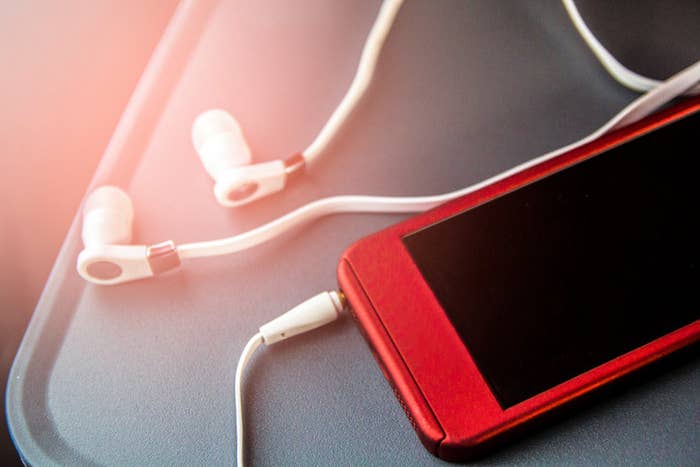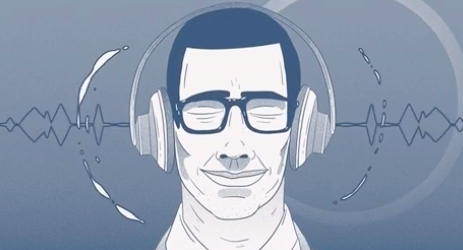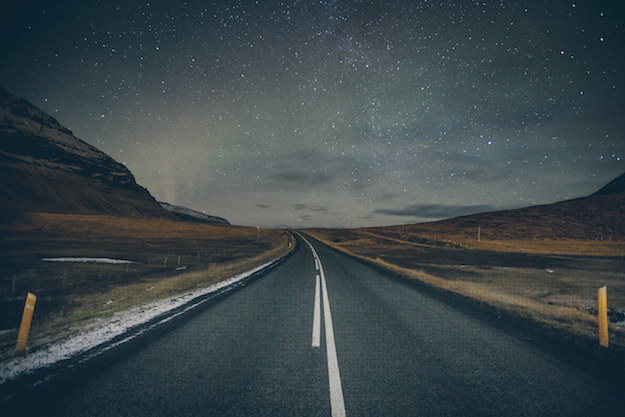In January, I fell into a hole, one deeper than the usual series of potholes I hit every year when days are short and cold. No, this was a chasm; a bleak, black pit that swallowed me whole. That’s because this January, I was hit with the double whammy of my dog dying and being forced to sell my house, or else continue living next to the neighbor from hell. In the span of two months, I lost two things that gave me any sense of security — the two things that formed the foundation of what made me feel like I had a place and a home.
I didn’t really see a reason to get out of bed, shower, or talk to other people, so I did the traditional thing of seeing a therapist, but I also subscribed to The Hilarious World of Depression, a podcast that started in 2016 where comedians talk about depression.
I listened not because I thought it would make me feel better, but because I’m friends with the show’s first ever guest, Peter Sagal of NPR’s Wait Wait…Don’t Tell Me. But it turned out that listening to the stories of other people — funny people — talk about the hurt, and sometimes ridiculousness, of dealing with the same crisis about how hard it was to take a shower was like realizing I had a friend next to me trying to claw out of the same black pit.

Sad = Good?
Science could explain why I felt that I had a buddy next to me. In a series of studies published in the last two years, a group of researchers from Europe and Australia have found that listening to sad music can help make people feel less sad, or at least feel a kind of sadness that’s comforting or even sweet. Lead researcher Tuomas Eerola, who has a doctorate in music cognition and is a professor at UK-based Durham University, relates it to having a good cry. “Afterwards, you have a feeling of relief or sense of goodness,” Eerola tells BuzzFeed Health.
One of the studies also found that people with more positive responses to sad music tended to be more empathetic and open to new experiences in general. “They are brave enough to engage in this challenge and paradoxical emotion. They get the benefit of engaging with it,” he says, adding that even though the study was done with music, the same concepts can translate to sad literature, sad movies, and, yes, sad podcasts.
Mental Health: In Private, In Your Ears
Podcasts about mental health can work on two levels, says Rachel Annunziato, who holds a doctorate in clinical psychology and is an associate professor of psychology and associate dean for strategic initiatives at Fordham University. The first is letting people know they’re not the only ones to feel this way, which, despite a growing awareness of the prevalence of mental illness, can be hard to internalize for yourself. A podcast about depression “could help you not feel alone, and it could be informative,” she says. “Maybe there will be something in there that’s really helpful for you to learn and hear — the ‘Gosh I’m not alone when it comes to this.’”
The second is that it’s delivered in a format usually consumed in private, releasing it from stigma because unless someone gets their hands on your phone, they won’t know what you’re listening to. “Maybe mental health literacy is improving, but I don’t know if the stigma has dissipated as much as we like,” says Annunziato. A podcast allows you to sidestep the possibility of being caught doing something for a problem you might not want your friends to know you have.

With podcasting, “you can make it as raw as you want,” Paul Gilmartin, host of The Mental Illness Happy Hour, tells BuzzFeed Health. “My podcast gets really raw and dark sometimes, and that’s comforting to people who think they’re more fucked up than anybody else,” he says. “If I were trying to do this show on broadcast radio, it wouldn’t work because somebody would edit it. Everything would be wrong.”
Gilmartin launched The Mental Illness Happy Hour in 2011, six months after he went off his meds and became consumed with thoughts of suicide, despite still being in therapy. The show is done in two parts: The first is a conversation with a notable person (which has included entertainers, authors, and medical professionals), and in the second part, Gilmartin reads anonymous listeners’ answers to a survey about mental illness.
The depressed comic may be a stereotype, but listening to long conversations with people for whom a crucial way of coping is taking really awful things and making them funny made me feel better about my own mental health issues — and that it’s OK that I sometimes make fun of them too.
“Mental illness is a real thing and I was fooled by it. I thought, ‘Somebody has to talk about this. Somebody has to spread the word about how powerful it is,’” Gilmartin says. “Somebody has to put this out there in a way that is accessible and hopefully compelling.”
For John Moe, host of The Hilarious World of Depression, the delivery is just as important as the content, which is why he explored this topic as a podcast instead of a book.
”There’s a million different ways you could say, ‘I want to kill myself.’ Inflection is everything in a sentence like that,” he says. For example, when comedian Jen Kirkman talks about how she started to have panic attacks at 13 and how, as a teenager, she thought being depressed meant she was smart — especially because she listened to the Smiths and Morrissey — it comes off as self-effacing and, in her delivery, absurd. But at the same time she’s making jokes, she’s sharing a truth about her own struggles with mental health.
Moe says he started with a podcast about depression because he knew a lot of comedians, but also because a “comedian’s job is to articulate something that is often felt but not said,” he says. “They’ll make an observation about airline travel, and it’s something you’ve thought but you haven’t heard someone else put into words. You can do the same thing about love or loneliness or depression.”
It’s one thing to read comedian Paul F. Tompkins’ writing about how he has depression, but it’s another to hear him deliver his description of depression as “this absurd thing that your own body’s chemicals do to you to make you feel sad,” and tag that observation with “that’s dumb.” The depressed comic may be a stereotype, but listening to long conversations with people for whom a crucial way of coping is taking really awful things and making them funny made me feel better about my own mental health issues — and that it’s OK that I sometimes make fun of them too.
Moe explains that his podcast fills an important and growing need: “So many people were just starving to talk openly about this thing, and I’ve always felt that step number one in trying to make a difference is to drag it out into the sunlight because it doesn’t want to be in the sunlight,” says Moe. “The disease wants to fester and it wants you to shut up about it.”
In a 2012 episode of Mental Illness Happy Hour with comedian Rob Delaney, Gilmartin and his guest talked about Delaney’s depression and alcoholism, and then read aloud from an anonymous listener whose sexual assault by an older sibling resulted in a pregnancy. It was a really dark episode, but, at least through Rob Delaney’s interview, they were able to keep the conversation buoyant because they found ways to joke with each other and with the listeners. I listened to this episode while running and my gut dropped — for Delaney, Gilmartin, and the listener who wrote in. Even though their experiences weren’t applicable to my own, I felt comforted that these people cared enough to talk about their struggles with mental illness in the hopes of helping someone else.
It’s because of listening to these podcasts that I’m writing this article and starting to talk about my own struggles with depression. Historically, feeling bad has meant that I would isolate myself (and after being crushed in January, I went on a 16,000-mile road trip by myself), but listening to these podcasts offered what Eerola described as a “comforting sadness.” I felt a lot less alone when listening to other people talk about their own loneliness or sadness or mental health struggles, and then I even found that I wanted to be less isolated myself (which is why I’m writing this from my mom’s dining room table).
Not For Everyone, Or Everyone All The Time
Annunziato cautions that sad-listening to podcasts won’t work for everyone with a mental illness, and that for some, these podcasts can do more harm than good because listening still steeps the listener in serious (and sometimes dark) material. She suggests trying them out, but checking in with yourself and asking “Is doing this potentially making me ruminate more about how I’m feeling?” Gilmartin himself says he can’t listen to other shows about mental illness because it would consume him when combined with the work he does. Sometimes it’s just too much.

And that’s why I tune in and out of these podcasts. I’ve spent much of 2017 on the road, driving thousands of miles for a trip that was, on the surface, to see all the states I hadn’t been to yet. But I really headed west to see if I could drive out of that big black hole that had yawned itself open at my feet in January. It worked, mostly, but I stumbled, too. Somewhere in Wyoming in August, I thought that maybe no one would care if I turned my car into the next river. And at that moment, I couldn’t have another session with my therapist, so I pulled over and cued up an episode of The Hilarious World of Depression with John Darnielle of the band the Mountain Goats, who talked about how he listens to other artists’ sad music when he’s depressed.
I felt a calm. And while the idea of driving myself into a river wasn’t a healthy thought, I’m certainly not alone in having it, and I shouldn’t feel like a bad person for it.
And then I kept driving on.
Jen A. Miller is writer from the great state of New Jersey. Her third book Running: A Love Story was published last year.
To learn more about depression, check out the resources at the National Institute of Mental Health here.
And if you need to talk to someone immediately, you can reach the National Suicide Prevention Lifeline at 1-800-273-TALK (8255) and or the Crisis Text Line by texting HOME to 741741. Suicide helplines outside the US can be found here.
Follow along at BuzzFeed.com/MentalHealthWeek from Oct. 2 to Oct. 8, 2017.


